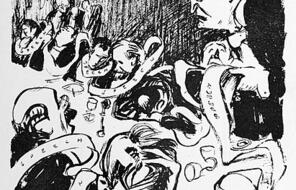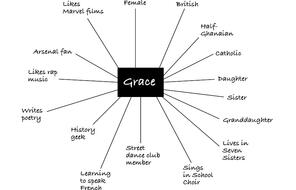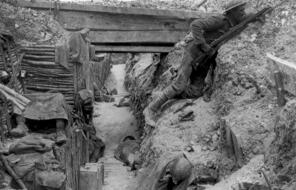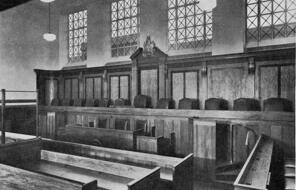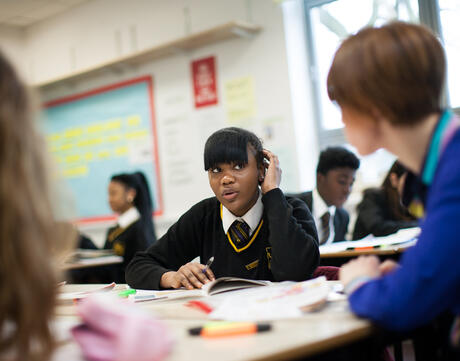
Get Prepared to Teach this Scheme of Work in Your Classroom
Preparing to Teach
Understanding Our Approach
At Facing History and Ourselves, we give students the tools to become active, thoughtful, and responsible citizens, who engage critically with the world around them. We do so by providing students with opportunities to engage with the complexities of identity, to explore how difference can influence our treatment of others, and to reflect on the impact and consequences of our choices and actions, alongside core curriculum content. This learning, which encourages students to understand their interconnectedness with others and their individual agency, is supported through a range of activities and teaching strategies that develop students’ critical reading and thinking, negotiation, collaboration, and active listening skills. These strategies work to promote democracy in the classroom, creating a safe space where difficult conversations can be had and where students can learn to disagree constructively. Students are thus provided with the tools to participate in their communities, so that they can bring about the changes they would like to see and help create a kind and compassionate society.
Fostering a Reflective Classroom Community
We believe that a classroom in which a Facing History and Ourselves unit is taught ought to be a microcosm of democracy – a place where explicit rules and implicit norms protect everyone’s right to speak; where different perspectives can be heard and valued; where members take responsibility for themselves, each other, and the group as a whole; and where each member has a stake and a voice in collective decisions. We recommend that teachers create a strong foundation for a reflective classroom through the use of the following strategies:
Even if you have already established rules and guidelines with your students to help bring about these characteristics in your classroom, we recommend taking a moment to read the teaching strategies and consider how you might frame your classroom contracts and student journals within the context of this scheme of work, weaving them into your daily practice so they become part of the culture of the classroom. The first lesson in this unit is focused on Building a Classroom Community through the creation of a classroom contract.
Teaching This Scheme of Work
We understand that teachers may use these lessons in a variety of classroom settings and ways. If circumstances allow, we recommend that you teach these lessons in the order we are presenting them, adapting them as necessary to fit the needs of your schools and communities. Also, while the scheme of work is divided into 50-minute lessons, some teachers may omit certain activities because of available time, or elect to include extension activities (located at the end of most lessons) to explore topics in greater depth. Whenever lessons are modified, it is important that students still have time and space to process the material, both individually and with their peers, especially at the end of the lesson so they can reflect on what they have read, seen, heard, and discussed in a safe and nurturing space.
Unit Essential Question
The following essential question provides a framework for exploring this unit’s main ideas and themes: What can J. B. Priestley’s An Inspector Calls teach us about the impact of our individual and collective decisions and actions on others?
This essential question challenges students to make important connections between the themes in the play and the power of the choices and decisions they make today. We do not expect students to determine a single, ‘correct’ answer. Essential questions are rich and open-ended; they are designed to be revisited over time, and as students explore the content in greater depth, they may find themselves emerging with new ideas, understanding, and questions.
Guiding Questions
Each lesson includes one or more guiding questions. Unlike the unit’s essential question, which is broad and open-ended, guiding questions help to direct student enquiry at the lesson level and are aligned with its specific measurable learning objectives. Unlike essential questions, guiding questions might have a clear answer, which students should be able to support with specific evidence from the lesson to demonstrate their understanding of the content.
Corresponding PowerPoints
There is a corresponding PowerPoint for each lesson that includes student-facing slides and activity instructions in the notes section for the teacher. The PowerPoints are intended to be used alongside, and not instead of, the lesson plans because the latter include important rationales, context, and detailed activity instructions that teachers should familiarise themselves with before teaching the lesson. The PowerPoints include basic content and student-facing prompts from the lesson plans but are minimally designed because we expect teachers to adapt them to fit the needs of their students and class.
Homework Suggestions
In addition to the activities, many lesson plans in this unit also contain suggestions for homework assignments that are designed to build on classroom learning. These are not compulsory. Rather, they are ideas that teachers can use if they fit with the homework approach of your school. They could also be modified as additional in-class activities.
Marking Criteria Codes
To succeed in both school and the world beyond, it is vital that students are not only able to produce clear and coherent text that responds to the criteria set, but that they are able to write in Standard English, using accurate punctuation, spelling and grammar. Throughout the scheme of work, we, therefore, recommend that teachers use Marking Criteria Codes when reviewing students’ written work to help them develop the structure and content of their writing, and their written English. These marking codes enable teachers to nurture their students as effective writers by giving them in-depth feedback, which requires proactive student engagement.
The GCSE Supplements
There are five optional GCSE supplements in this scheme of work: three of them are focused on developing students’ persuasive writing skills and the other two are focused on developing students’ essay writing skills. These supplements are not lessons and do not need to be taught as such; rather, they are structured in such a way as to ensure that the various steps necessary for writing a persuasive piece, an analytical paragraph or an essay are outlined in an appropriate order. Depending on how many class periods you can devote to writing instruction, you may decide that your class does not need to follow all of the steps or that you want your class to do some of the steps in class and others at home. Engage with the GCSE supplements in this scheme of work in the way that works for your class context, adapting them to your students’ needs as you see fit.
Developing Student Vocabulary
The readings and videos in this unit introduce some vocabulary and concepts that may pose a challenge for your students, especially for struggling readers, so you may want to consider using the Word Wall strategy to keep a running list of critical vocabulary posted in your classroom that you and your students can refer to over the course of the unit. Students might have a corresponding list in a section of their exercise books, and you could also challenge them to incorporate Word Wall terms into their writing and discussions to help them internalise and understand these challenging terms and concepts. Some lessons contain ideas for the Word Wall in the teacher notes. You might also encourage students to add their own vocabulary and concept terms as they encounter them.
Unlimited Access to Learning. More Added Every Month.
Facing History & Ourselves is designed for educators who want to help students explore identity, think critically, grow emotionally, act ethically, and participate in civic life. It’s hard work, so we’ve developed some go-to professional learning opportunities to help you along the way.
Exploring ELA Text Selection with Julia Torres
On-Demand
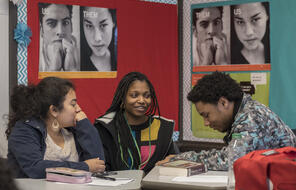
Working for Justice, Equity and Civic Agency in Our Schools: A Conversation with Clint Smith
On-Demand

Centering Student Voices to Build Community and Agency
On-Demand







